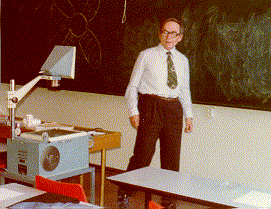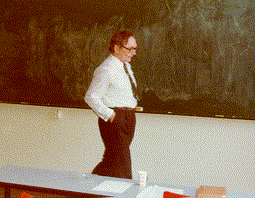He took a classic problem of mathematical physics (atomic collision) and gave an excellent detailed analysis of problem solution through use of the technological chain given above.
The meeting was followed by a one-day seminar arranged by the Mathematical Centre in Amsterdam, where Professor Yanenko in his lecture "Numerical solution of problems in fluid mechanics" discussed the splitting-up method to solve partial differential equations in many dimensions. Examples are ADI by Douglas and Rachford (1955) and the fractional step method by Yanenko (1959).


Professor Yanenko lecturing in Amsterdam (1977).
His lecture also discussed how to use the method on non-rectangular regions, and stressed that the final aim for every theory is to reduce a complex problem into simpler, or in this case to reduce a many-dimensional problem into one-dimensional problems.
Professor Yanenko invited the group to have its sixth meeting in Novosibirsk. The group unanimously accepted Professor Yanenko's kind invitation.
An official invitation for a meeting in Novosibirsk arrived from Academician G. I. Marchuk to the 1978 May meeting in Toronto, and preparations for the meeting started there (Professor Yanenko could however not attend the Toronto meeting). It was decided that the main theme of the meeting in Novosibirsk would be software for partial differential equations, including preparations for the forthcoming working conference on that subject. At the suggestion of Professor Stetter one extra day would be organized for presentations by Soviet experts.
Professor Yanenko attended the first working conference arranged by WG 2.5, "Performance Evaluation of Numerical Software" in Baden, Austria, December 1978. He was a panel member on "The use of mathematical software outside the mathematical software community", and had earlier assisted the programme committee in finding Soviet speakers for the conference.
The Novosibirsk meeting in September 1979 was a large success, largely due to the efforts of Professor Yanenko in assembling a large number of Soviet specialists, and the excellent local arrangements. As decided in Toronto, the first day was an open seminar, with Professor Yanenko giving the first talk "Some methods in the numerical simulation of complicated flows". On the second day he participated in a panel discussion on partial differential equations, where he discussed mesh refinement. He was also the coauthor together with E. A. Araise and V. P. Shapeiev of a presentation "Symbolic manipulation by using computers" on the third day.
The meeting in Novosibirsk's academic city Akademgorodok and the technical and cultural visits to some of the major Soviet cities that Professor Yanenko arranged for the principal members of WG 2.5 are among my most outstanding memories.
Professor Yanenko was unable to attend the Harwell meeting in May 1980, but he sent us a paper "Monte Carlo methods in physics and hydrodynamics".
It was a great pleasure for me to welcome Professor Yanenko and his wife to the working conference "PDE Software: Modules, Interfaces and Systems" arranged in Söderköping, Sweden, in August 1983. He was a member of its programme committee, an invited speaker on "Efficiency of the numerical algorithms and the decomposition principle for modern computers", and, despite obviously not being well, a very active participant with recorded comments to about half of the papers. In addition he initiated a discussion session on convergence acceleration and multigrid methods. It is thus very fitting that the proceedings of this conference, where he played such a major role, have been dedicated to the memory of N. N. Yanenko.
For the meeting of WG 2.5 in Sweden he had nominated his associate Professor Y. I. Shokin as a new member, and he was happy to see him elected. We in WG 2.5 are happy that our contact with the Siberian Division of the Academy of Sciences continued, in spite of the tragic death of Academician Yanenko.
I consider Professor Yanenko to have been an outstanding scientist, with an ability to find new directions in his research. His early interest in analytical methods and symbolic manipulation in connection with partial differential equations were found to be prophetic in Söderköping (and, more important, coming to realization).
He was also very pleasant and entertaining at the social parts of the meetings. He showed a great interest at the excursions arranged in connection with the Söderköping conference, and was always eager to learn. I felt the news of the death of Nickolay Nickolaevich on January 16, 1984, as a personal loss, the loss of a friend.
Bo Einarsson, February 1984
Chairman of IFIP WG 2.5, 1978-1983
Last modified: 2 October 1995
boein@nsc.liu.se
